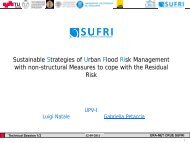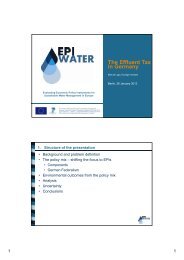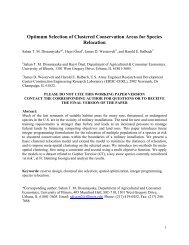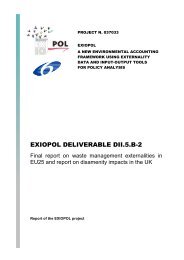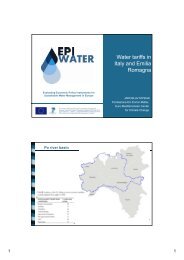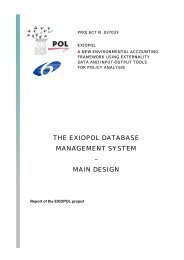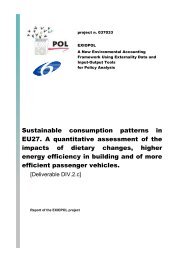Gulf and European Energy Supply Security - Feem-project.net
Gulf and European Energy Supply Security - Feem-project.net
Gulf and European Energy Supply Security - Feem-project.net
Create successful ePaper yourself
Turn your PDF publications into a flip-book with our unique Google optimized e-Paper software.
<strong>Energy</strong> <strong>Security</strong>: Potential for EU-GCC Cooperation<br />
second civil war <strong>and</strong> the current war in Darfur to the<br />
prospect of oil income.<br />
The Oil <strong>and</strong> Gas Journal lifted its estimate of<br />
Sudan’s reserves from 563 million barrels in 2006<br />
to 5 billion barrels in 2007. In the case of Sudan, the<br />
civil war prevented oil exports <strong>and</strong> revenue, creating<br />
conditions whereby the two sides were encouraged<br />
to reach a compromise.<br />
Algeria<br />
During the period of acute political violence<br />
that lasted from January 1992 to about 2002,<br />
attacks were overwhelmingly directed against<br />
human targets rather than economic installations.<br />
Very few attacks were recorded against oil <strong>and</strong> gas<br />
installations, in part because of their location in the<br />
desert, which makes them more easily defensible.<br />
The lowest point was reached in 1987: thereafter,<br />
Algeria began to open its doors again to international<br />
oil companies, <strong>and</strong> production increased until 1991.<br />
The period of political violence (1992-2002) coincided<br />
with a bumpy plateau in Algerian production,<br />
which does not contradict the hypothesis that the<br />
conflict did constrain production growth, even if<br />
no major attacks were launched against oil <strong>and</strong><br />
gas installations. Surely, the jump in production<br />
between 2002 <strong>and</strong> 2003 appears to indicate that the<br />
improvement of the situation allowed better use of<br />
existing resources.<br />
Conclusions on Historical experience of oil<br />
supply Interruptions Due to Armed Conflict<br />
Oil <strong>and</strong> gas installations appear to be much<br />
more resilient to armed conflict than is normally<br />
acknowledged. Major damage is inflicted only in<br />
cases in which hostilities take place in the immediate<br />
vicinity of the installation (initial phase of the Iraq-<br />
Iran war, initial phase of the Biafra war, Sudanese<br />
civil war), or one side has control of the installations<br />
<strong>and</strong> chooses to sabotage them (Iraqi troops in<br />
Kuwait, MEND in Nigeria). But this is rare. Moreover,<br />
interstate wars are a low-probability event.<br />
In contrast, civil wars’ frequency has not<br />
diminished at the global level. Historically, civil wars<br />
have caused limited damage to existing installations,<br />
but they have hindered the desired investment<br />
44<br />
in new development <strong>and</strong> attainment of target<br />
production levels.<br />
Cases in which violent action on the part of<br />
non-state actors has inflicted significant damage<br />
to existing installations include the “insurgency”<br />
phase in Iraq <strong>and</strong> MEND in Nigeria. In both cases,<br />
the relevant non-state actor was based in the same<br />
territory as the oil installations, close to population<br />
centers which the government could not control<br />
well. If oil installations are in remote or uninhabited<br />
locations – as is the case in Algeria or Angola <strong>and</strong><br />
many other countries including Saudi Arabia – then<br />
the cost-benefit balance of attacking oil installations<br />
is considerably worse for the non-state actor.<br />
However, it is very obvious that government’s<br />
inability to overcome or reabsorb violent opposition<br />
discourages international oil company investment<br />
even if the violence does not affect the vicinity<br />
of oil <strong>and</strong> gas installations; but if the expected<br />
return is large enough, <strong>project</strong>s will be undertaken<br />
nevertheless. The intensity of phenomena or<br />
the extent of the discrepancy between what is<br />
achieved <strong>and</strong> what would be optimal varies over<br />
time, justifying the need for reserve capacity<br />
<strong>and</strong> strategic stocks. But this need should not be<br />
measured against the theoretical optimum: it<br />
should be measured against the average that is<br />
normally achievable.<br />
3. scenarios of Future Conflict <strong>and</strong> their<br />
Potential Implications for oil supplies<br />
3.1 The Middle East<br />
The discussion above clearly indicates that<br />
doomsday scenarios are not justified in the light of<br />
historical experience. An interstate war involving<br />
all major oil producers in the <strong>Gulf</strong> <strong>and</strong> provoking<br />
the disappearance of all <strong>Gulf</strong> oil from the market is<br />
simply not on the cards.<br />
All interstate war episodes in the <strong>Gulf</strong> since 1980<br />
have been linked to Iraqi action <strong>and</strong> the regime<br />
of Saddam Hussein. All other <strong>Gulf</strong> nations have<br />
demonstrated a strong inclination towards avoiding<br />
conflict<br />
This is true also for the Islamic Republic of Iran,<br />
which has used proxies to engage in terrorist or



